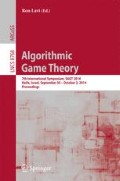Abstract
The stable allocation problem is one of the broadest extensions of the well-known stable marriage problem. In an allocation problem, edges of a bipartite graph have capacities and vertices have quotas to fill. Here we investigate the case of uncoordinated processes in stable allocation instances. In this setting, a feasible allocation is given and the aim is to reach a stable allocation by raising the value of the allocation along blocking edges and reducing it on worse edges if needed. Do such myopic changes lead to a stable solution?
In our present work, we analyze both better and best response dynamics from an algorithmic point of view. With the help of two deterministic algorithms we show that random procedures reach a stable solution with probability one for all rational input data in both cases. Surprisingly, while there is a polynomial path to stability when better response strategies are played (even for irrational input data), the more intuitive best response steps may require exponential time. We also study the special case of correlated markets. There, random best response strategies lead to a stable allocation in expected polynomial time.
Access this chapter
Tax calculation will be finalised at checkout
Purchases are for personal use only
Preview
Unable to display preview. Download preview PDF.
References
Abraham, D.J., Levavi, A., Manlove, D.F., O’Malley, G.: The stable roommates problem with globally-ranked pairs. In: Deng, X., Graham, F.C. (eds.) WINE 2007. LNCS, vol. 4858, pp. 431–444. Springer, Heidelberg (2007)
Ackermann, H., Goldberg, P.W., Mirrokni, V.S., Röglin, H., Vöcking, B.: Uncoordinated two-sided matching markets. SIAM Journal on Computing 40(1), 92–106 (2011)
Baïou, M., Balinski, M.: The stable allocation (or ordinal transportation) problem. Math. Oper. Res. 27(3), 485–503 (2002)
Blum, Y., Roth, A.E., Rothblum, U.G.: Vacancy chains and equilibration in senior-level labor markets. Journal of Economic Theory 76(2), 362–411 (1997)
Chen, B., Fujishige, S., Yang, Z.: Decentralized market processes to stable job matchings with competitive salaries. KIER Working Papers 749, Kyoto University, Institute of Economic Research (December 2010)
Cseh, A., Skutella, M.: Paths to stable allocations, volume (2014), http://arxiv.org/abs/1211.2169
Dean, B.C., Munshi, S.: Faster algorithms for stable allocation problems. Algorithmica 58(1), 59–81 (2010)
Diamantoudi, E., Miyagawa, E., Xue, L.: Random paths to stability in the roommate problem. Games and Economic Behavior 48(1), 18–28 (2004)
Fleiner, T.: On stable matchings and flows. In: Thilikos, D.M. (ed.) WG 2010. LNCS, vol. 6410, pp. 51–62. Springer, Heidelberg (2010)
Gale, D., Shapley, L.: College admissions and the stability of marriage. American Mathematical Monthly 1, 9–14 (1962)
Goemans, M.X., Li, E.L., Mirrokni, V.S., Thottan, M.: Market sharing games applied to content distribution in ad hoc networks. IEEE Journal on Selected Areas in Communications 24(5), 1020–1033 (2006)
Gusfield, D., Irving, R.W.: The Stable marriage problem - structure and algorithms. Foundations of computing series, pp. 1–240. MIT Press (1989)
Klaus, B., Klijn, F.: Paths to stability for matching markets with couples. Games and Economic Behavior 58(1), 154–171 (2007)
Knuth, D.E.: Mariages stables et leurs relations avec d’autres problèmes combinatoires. Collection de la Chaire Aisenstadt. Les Presses de l’Université de Montréal, Montréal, Québec, Canada (1976) Edition revue et corrigée (1981); Currently available from Les Publications CRM / Centre de Recherches Mathématiques, Université de Montréal, Montréal, Québec.
Kojima, F., Ünver, M.U.: Random paths to pairwise stability in many-to-many matching problems: a study on market equilibration. International Journal of Game Theory 36(3-4), 473–488 (2008)
Roth, A.E., Vate, J.H.V.: Random paths to stability in two-sided matching. Econometrica 58(6), 1475–1480 (1990)
Author information
Authors and Affiliations
Editor information
Editors and Affiliations
Rights and permissions
Copyright information
© 2014 Springer-Verlag Berlin Heidelberg
About this paper
Cite this paper
Cseh, Á., Skutella, M. (2014). Paths to Stable Allocations. In: Lavi, R. (eds) Algorithmic Game Theory. SAGT 2014. Lecture Notes in Computer Science, vol 8768. Springer, Berlin, Heidelberg. https://doi.org/10.1007/978-3-662-44803-8_6
Download citation
DOI: https://doi.org/10.1007/978-3-662-44803-8_6
Publisher Name: Springer, Berlin, Heidelberg
Print ISBN: 978-3-662-44802-1
Online ISBN: 978-3-662-44803-8
eBook Packages: Computer ScienceComputer Science (R0)

